
Pretzel Logic is the third studio album by American rock band Steely Dan, released by ABC Records on February 20, 1974. It was recorded at the Village Recorder in West Los Angeles, California, with producer Gary Katz. The album was Steely Dan's last to be made and released while the group was still an active touring band, as well as the final album to feature the band's full quintet-lineup of Becker, Fagen, Denny Dias, Jim Hodder, and Jeff "Skunk" Baxter, though it also features significant contributions from many prominent Los Angeles-based studio musicians.

Katy Lied is the fourth studio album by American rock band Steely Dan, released by ABC Records in March 1975; reissues have been released by MCA Records since ABC Records was acquired by MCA in 1979. It was the first album the group made after they stopped touring, as well as their first to feature backing vocals by Michael McDonald.

Tom Petty and the Heartbreakers is the debut studio album album by the American rock band Tom Petty and the Heartbreakers, released on November 9, 1976, by Shelter Records. The album was recorded and mixed at the Shelter Studio in Hollywood, California.

Toulouse Street is the second studio album by American rock band the Doobie Brothers. It was released in July 1972, by Warner Bros. Records. It was the band's first album with bassist Tiran Porter and also the first with drummer Michael Hossack to augment existing drummer John Hartman, putting in place their trademark twin-drummer sound. Toulouse Street is the name of a street in the French Quarter of New Orleans. The cover and inside centerfold photos were taken at a former brothel on Toulouse Street.
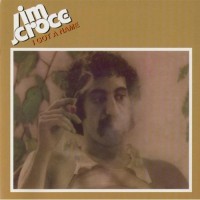
I Got a Name is the fifth and final studio album and first posthumous release by American singer-songwriter, Jim Croce, released on December 1, 1973. It features the ballad "I'll Have to Say I Love You in a Song", which reached number 9 in the US singles chart, and the ballad "Salon and Saloon", the last song Croce recorded in his lifetime. The song, which is noted for its sparse piano-only vocal backing, was written by his guitarist and friend Maury Muehleisen and was included on the album as a gift to the writer.

First Step is the debut studio album by the English rock band Faces, released on 27 March 1970 by Warner Bros. Records. The album was released only a few months after the Faces had formed from the ashes of the Small Faces and The Jeff Beck Group. The album is credited to the Small Faces on all North American issues and reissues, while record labels for initial vinyl printings give the title as The First Step.

Second Helping is the second studio album by Lynyrd Skynyrd, released on April 15, 1974. It features the band's biggest hit single, "Sweet Home Alabama", an answer song to Neil Young's "Alabama" and "Southern Man", which reached #8 on the Billboard Hot 100 chart in August 1974.
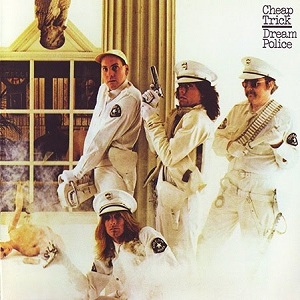
Dream Police is the fourth studio album by American rock band Cheap Trick. It was released in 1979, and was their third release in a row produced by Tom Werman. It is the band's most commercially successful studio album, going to No. 6 on the Billboard 200 chart and being certified platinum within a few months of its release.

Steppenwolf 7 is the fifth studio album by Canadian-American rock band Steppenwolf. The album was released in November 1970, by Dunhill Records. It is the first Steppenwolf album with new bass player George Biondo. The album’s numerical title reflects the fact that it was the band’s seventh album release for ABC/Dunhill records . While the album featured Steppenwolf's trademark rock and roll sounds, none of the songs were able to make the top 40. The album featured a cover of Hoyt Axton's "Snowblind Friend", their second cover of one of his antidrug songs. Along with "Who Needs Ya", it was one of two singles from the album which made the charts, but fell short of the top 40. The album track "Renegade" is autobiographical for lead vocalist John Kay, recounting his flight with his mother from the Soviet occupation zone to the West in 1948. The intro to "Earschplittenloudenboomer" is spoken by Kay partially in German.

Best of The Doobies is the first greatest hits album by the Doobie Brothers. The album has material from Toulouse Street through Takin' It to the Streets, and is also a diamond record. The album was released by Warner Bros. Records on October 29, 1976, and has been re-released numerous times.
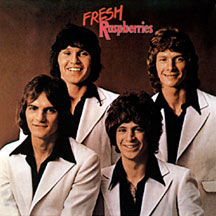
Fresh is the second studio album by Raspberries, released in 1972. It contains the two top 40 singles "I Wanna Be with You" which reached number 16 on the Billboard Hot 100, number 10 on Cash Box and number 7 on Record World, and "Let's Pretend" which reached number 35 on Billboard, number 18 on Cashbox, and number 14 on Record World. It was their highest-charting album, peaking at number 36 on the Billboard 200 album chart.

On Tour with Eric Clapton is a 1970 album by Delaney & Bonnie with Eric Clapton, recorded live at the Fairfield Halls, England. Released on Atco Records, it peaked at No. 29 on the Billboard 200 in April 1970, at No. 39 on the UK Albums Chart, and was certified a gold record by the RIAA.
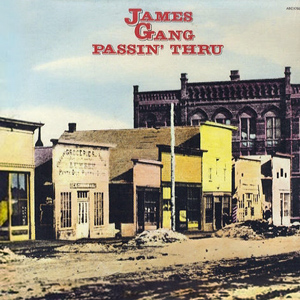
Passin' Thru is the fifth studio album by James Gang, released in October 1972, and their final album released on ABC Records. The band moved to Atco Records the next year.

Rock On is a 1972 one-off album of oldies covers by The Bunch, a group of English folk rock singers and musicians. The Bunch was put together by Trevor Lucas in late 1971 to record this sole album. This album consisted of covers of the band’s favourite songs by Elvis Presley, Buddy Holly, and The Everly Brothers, amongst others.
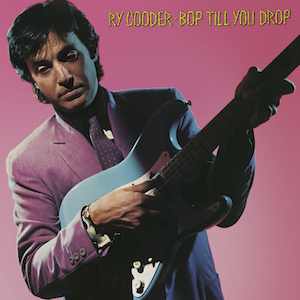
Bop Till You Drop is Ry Cooder's eighth album, released in 1979. The album was the first digitally recorded major-label album in popular music, recorded on a digital 32-track machine built by 3M.

What About Me is the fifth album by American psychedelic rock band Quicksilver Messenger Service. Released in December 1970 and recorded partly at the same sessions that produced Just for Love, the album is the last to feature pianist Nicky Hopkins and the last pre-reunion effort to feature founding members David Freiberg and John Cipollina. Several tracks, including "Baby Baby", "Subway" and "Long Haired Lady" had been played regularly at shows through 1970, previewing the album.

Mott the Hoople is the debut studio album by the band of the same name. It was produced by Guy Stevens and released in 1969 by Island Records in the UK, and in 1970 by Atlantic Records in the US. It was re-issued by Angel Air in 2003 (SJPCD157).

Loose is a 1972 album by the rock band Crazy Horse, the follow-up to their self-titled debut. It marked the departure of founding guitarist Danny Whitten, as well as Jack Nitzsche and Nils Lofgren. In their place for this album were George Whitsell and Greg Leroy on guitars, and John Blanton on organ.

Crazy Moon is the fourth album by the American band Crazy Horse. It was released by RCA Records in 1978. The record was recorded at the Broken Arrow in Redwood City, Kendun Studio in Burbank, Village Records in West Los Angeles, and Sound City in Van Nuys.

Dedication is a 1981 album by American singer Gary U.S. Bonds.




















